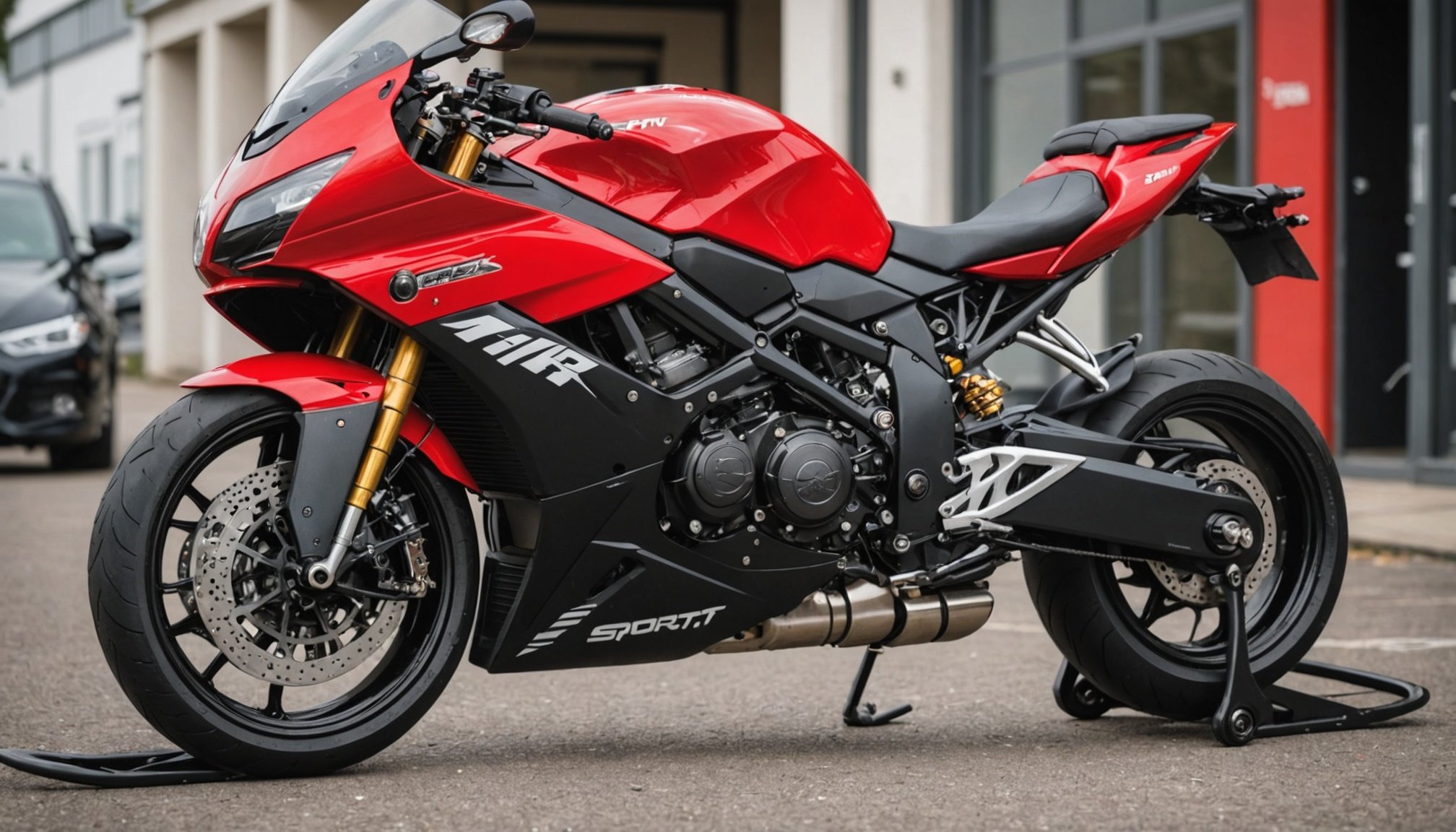Essential Legal Guidelines for Sport Bike Modifications in the UK: What You Need to Know
Understanding the Legal Framework
When it comes to modifying your sport bike in the UK, it’s crucial to understand the legal framework that governs these changes. The UK has strict regulations to ensure that all vehicles, including motorcycles, are safe for use on public roads.
Road Legal Requirements
For a motorcycle to be considered road legal, it must meet specific standards set by the UK government. Here are some key requirements:
In parallel : Unlocking Peak Performance: Ideal Engine Configurations for Sport Bikes in the UK
- Number Plates: Your bike must have the correct number plates fitted, both at the front and rear. These plates must conform to the UK’s number plate regulations, including the correct font, size, and spacing.
- Lights and Reflectors: Your bike must be equipped with functioning headlights, taillights, and reflectors. These are essential for visibility and safety on public roads.
- Tyres: The tyres on your bike must be in good condition and meet the UK’s tyre safety standards. This includes the correct tread depth and no signs of damage.
- Brakes: Your bike’s braking system must be in good working order. This includes both the front and rear brakes.
- Emissions: Your bike must comply with the UK’s emissions standards. This includes having a functioning catalytic converter if your bike is equipped with one.
Insurance Implications
Modifying your sport bike can significantly impact your motorbike insurance. Here’s what you need to know:
- Disclosure of Modifications: It is essential to inform your insurance provider about any modifications made to your bike. Failing to do so could invalidate your policy.
- Increased Premiums: Modifications, especially performance-enhancing ones, can increase your insurance premiums. This is because insurers view modified bikes as higher risks due to their potential for higher speeds and more expensive repairs.
- Approved Security Systems: Using approved security systems such as chains, locks, and tracking devices can help reduce your insurance premiums. Keeping your bike locked securely in a garage overnight is also well-regarded by insurers.
Types of Modifications and Their Legal Implications
Not all modifications are created equal, and some have more significant legal implications than others.
Also to read : Essential Tips for Safely Regaining Control of Your Sport Bike After a Skid on UK Roads
Performance Modifications
Performance modifications, such as engine tuning, exhaust system upgrades, and rear suspension tweaks, can enhance your bike’s performance but may also affect its road legality.
- Engine Tuning: Any engine modifications must ensure that the bike still complies with emissions standards. Non-compliant modifications can result in fines and even the bike being taken off the road.
- Exhaust System Upgrades: Aftermarket exhaust systems must meet noise and emissions regulations. Loud or non-compliant exhausts can lead to fines and legal action.
- Rear Suspension: Modifications to the rear suspension must not compromise the bike’s stability or safety. Ensure that any changes are done by a qualified mechanic and meet UK safety standards.
Cosmetic Modifications
Cosmetic modifications, such as custom paint jobs or aftermarket fairings, generally have fewer legal implications but still need to comply with certain regulations.
- Visibility and Safety: Any cosmetic modifications must not obstruct the bike’s lights, reflectors, or number plates. They should also not compromise the bike’s safety features.
- Type Approval: If you are fitting aftermarket parts, ensure they have the necessary type approval. This is especially important for parts that affect the bike’s safety, such as brakes and tyres.
Electric Bikes and E-Scooters: A Special Case
With the rise of electric bikes and e-scooters, there are specific legal guidelines to be aware of, particularly in the context of safety.
The “Buy Safe, Be Safe” Campaign
The UK government has launched the “Buy Safe, Be Safe” campaign to raise awareness about the dangers of buying faulty and unsafe e-bikes and e-scooters. Here are some key points from the campaign:
- Safe Purchases: Only buy e-bikes and e-scooters from reputable sellers. Avoid rogue online sellers who may sell defective or poorly manufactured parts.
- Manufacturer Recommendations: Only replace items with products recommended by the manufacturer. Using incompatible parts can lead to fires and other safety issues.
- Professional Help: Seek professional help when converting or repairing e-bikes and e-scooters. DIY modifications can be dangerous if not done correctly.
Legal Use of E-Bikes and E-Scooters
- E-Bikes: E-bikes are legal to use across the UK but must not exceed an output of 250 watts or travel faster than 15.5 mph. They must also be fitted with pedals and meet other safety standards.
- E-Scooters: E-scooters are banned on public land except in Government rental trial areas. This is due to safety concerns and the need for further regulation.
Practical Advice for Modifying Your Sport Bike
Here are some practical tips to keep in mind when modifying your sport bike:
Consult Professionals
- Mechanics: Always consult a qualified mechanic before making any significant modifications. They can advise on what changes are safe and legal.
- Insurance Providers: Inform your insurance provider about any modifications. They can guide you on what is covered and what might affect your premiums.
Keep Records
- Modification Documentation: Keep detailed records of all modifications, including receipts and certificates of compliance. This can be useful when selling the bike or dealing with insurance claims.
Stay Informed
- Legal Updates: Stay updated on any changes in UK laws and regulations regarding motorcycle modifications. This can help you avoid legal issues and ensure your bike remains road legal.
Table: Comparison of Legal Requirements for Different Types of Motorcycles
| Type of Motorcycle | Key Legal Requirements |
|---|---|
| Sport Bikes | Number plates, lights, reflectors, tyres, brakes, emissions compliance |
| Dual-Sport Bikes | Street-legal equipment (lights, mirrors, horn), registration plates, muffler, compliance with local regulations |
| E-Bikes | Output not exceeding 250 watts, speed not exceeding 15.5 mph, fitted with pedals |
| E-Scooters | Banned on public land except in Government rental trial areas |
Detailed List: Steps to Ensure Your Modified Bike Remains Road Legal
-
Check Local Regulations: Ensure your bike complies with all local regulations, including those related to noise, emissions, and safety.
-
Verify that your bike’s number plates are correctly fitted and meet UK standards.
-
Ensure all lights and reflectors are functioning correctly.
-
Check that your bike’s tyres meet the UK’s tyre safety standards.
-
Make sure your bike’s braking system is in good working order.
-
Ensure your bike complies with emissions standards.
-
Consult with Professionals:
-
Always consult a qualified mechanic before making any significant modifications.
-
Inform your insurance provider about any modifications to ensure your policy remains valid.
-
Keep Records:
-
Keep detailed records of all modifications, including receipts and certificates of compliance.
-
Document any changes made to the bike, including before and after photos.
-
Stay Informed:
-
Stay updated on any changes in UK laws and regulations regarding motorcycle modifications.
-
Follow safety campaigns and guidelines, such as the “Buy Safe, Be Safe” campaign for e-bikes and e-scooters.
Quotes from Experts
-
Local Transport Minister Simon Lightwood:
“E-bikes have transformed our urban areas by giving people an accessible and healthy way to travel, but this is being ruined by a handful of untrustworthy online retailers. These rogue sellers not only risk bringing defective and dangerous batteries into people’s homes, but undermine confidence in active travel as a whole.” -
London Fire Brigade’s Assistant Commissioner for Prevention and Protection, Craig Carter:
“E-bikes and e-scooters are a green and sustainable way to travel around our city. However, e-bikes and e-scooters can pose a significant fire risk and particularly the batteries used to power them have become one of London’s fastest-growing fire risks. They have destroyed homes and families have sadly lost loved ones in these fires.”
Modifying your sport bike can be an exciting way to enhance its performance and appearance, but it’s crucial to do so within the bounds of UK law. By understanding the legal framework, consulting professionals, keeping records, and staying informed, you can ensure your bike remains road legal and safe to ride.
Remember, the safety of both you and other road users is paramount. Always prioritize compliance with legal requirements and take the necessary steps to make sure your modifications do not compromise the safety and legality of your vehicle. Whether you’re riding on public roads, dirt trails, or private land, making sure your bike is legal and safe is essential for an enjoyable and worry-free riding experience.











